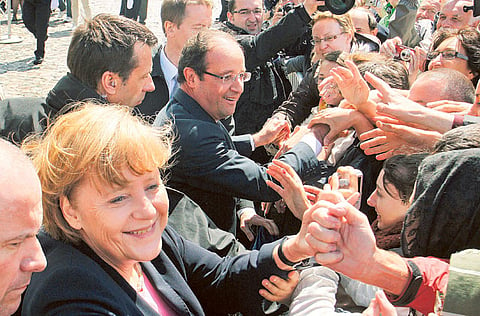Franco-German friendship crucial for strong euro
Hollande and Merkel put aside policy differences at ceremony in Reims

Paris: French President Francois Hollande and German Chancellor Angela Merkel said friendship between Europe’s biggest economies is the key to saving the euro, putting aside for a day their differences on how to tackle the currency zone’s debt crisis.
The two leaders met in the eastern French city of Reims 50 years after their predecessors, Charles de Gaulle and Konrad Adenauer, signed a reconciliation treaty to bury the enmity that had caused three wars in 90 years.
“At each step of European construction, the German-French friendship was the base,” Hollande said outside the city’s cathedral, standing alongside Merkel under rainy skies. “I propose to you that we open a new door to even tighter friendship.”
Hollande and Merkel clashed at the June 28-29 European summit, where the German chancellor faced pressure from France, Italy and Spain to agree greater burden sharing for the 17-country currency zone’s debt burden. The leaders agreed to ease the way to direct EU financing for troubled banks, start work on Europe-wide bank supervision, and eased access to the EU’s bailout mechanisms.
Finance ministers from all 27 European Union countries meet on Monday in Brussels to work out details on the agreement, and the euro-area ministers meet again on July 20.
“The European economic and currency union, as founded 20 years ago, has proved itself not strong enough yet,” Merkel said yesterday at the ceremony. “Our generation has to draw the right lessons from that.”
Spanish yields rise
Yields on Spanish 10-year bonds fell to a three-week low of 6.17 per cent after the summit, before rising three consecutive days to the end of last week at 6.87 per cent. While the Stoxx Europe 600 Index lost 1 per cent to 254.41 at the close in London on Friday, the benchmark still advanced 1.3 per cent last week, its fifth straight week of gains and its longest winning streak since January.
“Last week’s EU summit delivered measures to manage the euro-area crisis while signaling limited but important progress toward regional integration and burden sharing,” Bruce Kasman, chief economist at JPMorgan Chase and Co, wrote in a note to clients on Saturday. “However, this week showed participants interpreting the agreement in widely different ways. These tensions will be evident at the eurogroup meeting.”
Among the issues finance ministers will have to tackle on Monday is how to start funnelling as much as 100 billion euros (Dh450 billion) in aid to troubled Spanish banks without boosting the Spanish government’s debt load. Ministers are likely to initially channel the money via a Spanish state agency because the 500 billion-euro European Stability Mechanism won’t be operational until a still-unspecified date in the summer, an EU official told reporters in Brussels on Friday on condition of anonymity.
Bank supervisor
Direct capital injections by the ESM into banks are unlikely to be authorised before two waves of Spanish recapitalisations are completed by the middle of next year, by when the ECB should have created a Europe-wide bank supervisor, the official said.
French Finance Minister Pierre Moscovici said in an interview with Figaro on July 1 that the French government sees jointly issued bonds as a solution to the crisis, while adding: “I understand that for the moment it’s a red line that our German friends can’t cross.”
Those differences were hidden on Sunday in Reims, whose cathedral was badly damaged by German shelling in World War I and where Supreme Allied Commander Dwight D. Eisenhower received the German surrender in World War II.
Flag Waving
Merkel and Hollande greeted crowds waving French and German flags before attending a ceremony at the cathedral where Catholic Archbishop Thierry Jordan read a message in both languages. The leaders opened a museum and then lunched at the town hall after their public addresses.
Hollande and Merkel now face a challenge that concerns not just their countries but Europe and its place in the world, Jordan said at the ceremony.
Hollande mentioned the euro crisis in his speech, saying that the proposed banking union agreed at the EU summit was the “first step to a budgetary union, which will open the way to stability, growth, and tighter ties”.
He said France and Germany must defend the euro with “strict rules, powerful instruments and common policies”.
France’s Moscovici said on Sunday that he expects “tangible progress” at the Brussels meeting, which will also tackle Greece’s plea for a relaxation of its bailout terms and Cyprus’s call for banking aid.
ECB vacancy
Finance ministers are also expected to fill a vacancy on the European Central Bank’s Executive Board, in a contest between Yves Mersch of Luxembourg and Antonio Sainz de Vicuna of Spain, the official said.
The ECB slot, empty since June 1, has to be filled before the ministers tackle two other sensitive appointments. Luxembourg Prime Minister Jean-Claude Juncker’s term as chairman of euro finance meetings expires on July 17, and the ESM permanent bailout fund requires a head. Germany has nominated Klaus Regling, head of the temporary bailout fund, to manage the permanent one as well.
Moscovici said on Sunday that France favours Juncker staying on in the euro group post.



